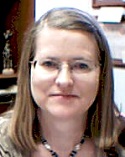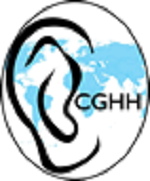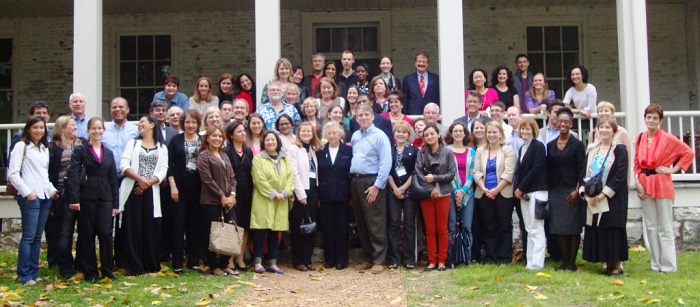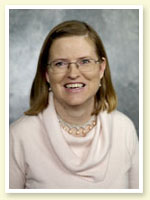The Coalition for Global Hearing Health
Carolyn Smaka: Jackie, it is always great to speak with you. Please tell me about how the Global Coalition for Hearing Health (CGHH) was founded. What was the impetus to start the organization?

Jackie Clark: It started back 1998 when I started providing humanitarian services in Mozambique on an annual basis, and became really frustrated in not being able to find out if others were also providing services in Mozambique, if others had gone in the past, or what resources were there. No one seemed to know. The more I started engaging with other humanitarians, I discovered we were all in the same boat. No matter what country we go into, we do not know who has been there on other humanitarian projects, what challenges they may have encountered, what types of programs were started, and so forth.
As I continued to network and my contacts grew, I would meet people who provided humanitarian services in the same city or country as other people I met, but neither party knew about the other.
I also heard a few sad stories. I would get an email from someone in the Middle East reporting that surgeons came to their area and implanted 500 children with cochlear implants. The parents were told that their children would be able to hear again if they allowed them to do the surgery, and the surgeons did their job, but there were no audiology services in the area. There were no plans to map these children. This also happened to 2,000 children in China about 10 years ago. You also hear about what I call the “helicopter drop”; that is, when people go in to a country and dispense hearing aids in a short amount of time, and leave without any follow-up or further long-term plan. There is no thought to sustainability of the program.
The more stories you hear and the more you talk with people who have provided humanitarian services, the light goes on that the world really needs our best and we are not necessarily giving our best.
Carolyn: How did this need transform into a fully-fledged non-profit organization?
 Jackie: I started researching existing organizations in audiology that had humanitarian committees. Believe or not, the only audiology organization that has a humanitarian committee is the International Society of Audiology (ISA). AAA does not have a humanitarian committee, and neither does ASHA. I also researched different lists through the Pan-American Society of Audiology, and didn’t find any there either.
Jackie: I started researching existing organizations in audiology that had humanitarian committees. Believe or not, the only audiology organization that has a humanitarian committee is the International Society of Audiology (ISA). AAA does not have a humanitarian committee, and neither does ASHA. I also researched different lists through the Pan-American Society of Audiology, and didn’t find any there either.
About 10 years ago, I became the chair of the humanitarian committee in ISA. We started trying to interact with organizations in other disciplines, one of them being the American Academy of Otolaryngology (AAO-HNS). In March 2008, Dr. Jim Saunders, then Chair of AAO-HNS International and Humanitarian Efforts Committee contacted me to see if we could start some collaboration in terms of humanitarian work.
When I met with Jim just 2 months later, I shared some of my serious concerns about activities that were going on worldwide in the premise of it being humanitarian work. He shared my concerns, and we communicated on these issues for about year or more. At that point, I said we really need an organization geared toward multi-disciplines involved in ear and hearing care.
Carolyn: Did you have any precedents? How does an audiologist and a university professor go about starting a non-profit organization?
Jackie: I think the Joint Commission on Infant Hearing is a great example of an organization that was started to provide forethought, structure and strategy for an important task across disciplines – implementing newborn hearing screening. As you know, the Joint Commission has done and is continuing to do great work. When I talked with Marion Downs early on about forming something like the Joint Commission, but pertaining to serving low-resourced regions, she said, “Well you know at the very first meeting of the Joint Commission, there were four of us. We started talking about best practices and sustainability and all the other issues that are important to us, and we went from there.”
I kept saying to Jim Saunders, “We really need to start something like the Joint Commission”. Jim and I talked with others including the president of Cochlear, Carl White at Utah State University, and Joanne Travers with Partners for a Greater Voice. In 2009, a group met in Washington, DC, at the Alexander Graham Bell offices to discuss the viability of forming an organization. There were probably about 10 of us, including Andrew Smith, who had just stepped down from the World Health Organization and joined by phone. He is involved with a charitable organization called Worldwide Hearing.
We started talking about what our mission, purpose and goals would be. I said that we needed to advocate for hearing health services and policies. Someone else chimed in and said we really need to equip professionals that are providing humanitarian services. Someone else said we really need to not just equip people, but empower them. The discussion went from, Why professionals only? Why not families? Why not educators? Why not the communities? My soapbox is best practices and ethical practices, so that was also a topic of discussion. In fact our purpose statement as it stands today really came out of that first meeting.
We also wanted to engage individuals that resided in developing countries, because they have a stake in all of this. By engaging all of the different stakeholders in the process through conferences and our website, we can be more successful in offering and promoting best practices, empowering individuals, advocating, and in general maximize our efforts in under-resourced areas in the U.S. and abroad. Finally, at the end of 2011, our application as a 501c-3 entity was accepted, and we officially became a not-for-profit foundation.
Carolyn: The annual conference must be a great way to network and share information.
Jackie. Yes, definitely. Even at the initial meeting at A.G. Bell, we saw a need to have an annual conference, invite professionals and people interested in hearing healthcare, and have planning sessions where we can exchange information. Most importantly, we wanted times where we could break into smaller groups and have open discussions, and eventually start talking about standards, guidelines, and so forth.
Our very first conference was in 2010 and American Academy of Otolaryngology wanted to host this inaugural meeting. We had people from 19 countries that attended, and there were a number of people from developing countries. We continue to have a good representation of international attendees. We have always said that individuals that come from developing countries should pay little to nothing for their conference fees, and we wanted to keep our costs down for everyone. The first conference had a $100 registration fee and people from developing countries paid nothing. It was a very impactful conference and people really started getting energized. The attendees crossed many disciplines; we had otolaryngologists, pediatricians, audiologists, speech pathologists, psychologists, individuals who are deaf, families of people who are deaf, and teachers of the deaf. We had quite a mix. Our meetings have always had multiple disciplines all coming together under one roof and trying to come to consensus.
In 2011, House Ear Institute hosted our second conference and it was a great meeting. We had another multinational conference, including a few more Asian countries than the prior year. In 2012, the HASS Eduplex in Pretoria, South Africa, hosted us. This year, Vanderbilt University hosted our annual meeting.

The 4th Coalition for Global Hearing Health Conference hosted by Vanderbilt University - Bill Wilkerson Center was an international resounding success.
Carolyn: You mentioned that your soapbox is best practices. When it comes to humanitarian work I would think that best practices, or what realistically could be implemented, would vary tremendously depending on the resources in a particular area.
Jackie: You have hit the nail on the head. The issue is that what will work in Zambia may not work in Ghana. What works in South Africa is not going to necessarily always work in Zambia, because Zambia has one audiologist, but South Africa has 900 speech and hearing therapists. Depending on your resources, what works and what doesn’t work is very different. When I start talking about best practices, I always have some say, “Does that mean we need to do electroacoustic measures on everyone when we dispense hearing aids?” That is not a reality because in some developing countries they do not have the equipment to do electroacoustic measures. However, even before these measurements existed, we still had outcome measures.
There are some things that are clear-cut relating to scope of practice. For example, in audiology my scope of practice does not allow me to write prescriptions in a developing country. Similarly, there are professionals in other countries who may want to start doing hearing testing, such as OB/GYNs. They may want to identify pathology, or even open a school for the deaf. They may have good intentions, but what in their scope of practice as an OB/GYN permits them to identify pathology of the ear, and then to do hearing tests? It is clearly not best practices to operate outside of your scope of practice. Granted you are not in your own country, but there is still no reason for you to change what you are doing.
Carolyn: What were some of the outcomes from this year’s conference?
Jackie: At this year’s conference, we really felt like we were hitting a stride. We are maturing as an organization and focusing on the following areas: advocacy in the media, training and education, utilizing/harnessing technology, best and ethical practice, and community and family empowerment. We decided to form five committees at this last conference and have each committee focus on one or two tangible goals each year. We identified the chairs of each committee, and everyone is fired up.
For training and education, Paige Stringer and Dimity Dorman are the co-chairs. Dimity is the founder of Hear and Say that is a non profit organization that serves over 600 children throughout Australia. Paige Stringer, who has severe hearing loss, is the founder of The Global Foundation for Children with Hearing Loss based in Washington. Lady Jean Wilson, a long-time philanthropist in the U.K. who started up Sightsavers with her husband Sir John Wilson, sat in on the committee for advocacy in media. On the best practices committee, we have Dave Fabry co-chairing with Diego Santana-Hernandez, whois an otolaryngologist and oversees a great deal of the Christian Blind Mission best practices and general programming. The other committees have equally impressive chairs and all have great momentum. It will be an exciting year ahead.
Carolyn: How can audiologists get involved or support your mission?
Jackie: Right now, we have a very important initiative. The post of technical director for the Office of the Prevention of Deafness and Hard Impairment at the World Health Organization is at risk of being discontinued. Sustained fundraising efforts are needed to ensure the continuation and long-term stability of this post for 2015 and beyond. Once the post is gone, it will no longer be opened up again. So the coalition sees this as a good opportunity on the advocacy side to get the word out to all of our disciplines. More information can be found on our website.
If you are a member of the Coalition for Global Hearing Health, then you can join one of the committees on the website. Within the committees, some of them have Blackboard and they already have projects underway and you can get involved.
If audiologists are interested in membership, the cost is $25 per year for individuals. We want to make it very affordable. We are charging $250 for organizations, who are based in developed countries, and for organizations whose fiscal and organizational offices are in a HINARI A or B country (in other words, developing countries), then their fee is $100 annually.
We can also act as a clearinghouse of helpful information that is out there. For example, the Christian Blind Mission is just finalizing some of their best practice guidelines. With permission, we can post it on our website. We received 100 portable audiometers from Purdue Pharmaceuticals with the understanding we would vet them and get them to humanitarian programs. We are gathering a lot of good information, and sharing it on our website, and we look forward to continuing to grow as we increase our members and participation among members through our committees.
Also, we will be holding our 5th Conference in July 2014 at St. Catherines at Oxford (in the U.K.), which is reasonably priced at $150 for 2 day registration and lunch.
Carolyn: If an audiologist or a student is interested in humanitarian work but has not yet participated in a service project, can he or she still join?
Jackie: Yes, anyone who is interested can become a member, and we do have a number of students that are members. You can interact with people who are doing great work, network and learn from the experiences of others. I teach a class here at UT Dallas called Planning and Providing Humanitarian Services in Developing Countries. I tell the students that it has taken me 15 years of gathering this information and I am handing it to you for you to use. Similarly, our student members or audiologists who have not participated in a humanitarian project can learn from the collective experience of our membership. You may get very excited about the idea of a service project, and as a member of the Coalition, you’ll get to see the bigger picture and start to consider things like sustainability.
You don’t know a lot of the ins and outs unless you start networking and putting two and two together. When we engage our colleagues in developing countries, we may see things differently. When you hear things like, “I really don’t like it when you come into my country and you drop 2,000 hearing aids in one week, and here I am left with the pieces. People start flooding me for free service.” Can you imagine 2,000 people needing help and only one audiologist! It’s invaluable to network and learn from one another, and I think membership offers an excellent opportunity for students or audiologists who are interested in humanitarian work.
Carolyn: You see a lot of missions in the news, and although the photos are heartwarming, I always wonder in the back of my mind about sustainability.
Jackie: Yes, we hear a lot of very sad stories, but there are also a lot of shining lights out there. There are many ethical, sustainable programs, such as Ears Inc. out of Australia, for example. Through Ears Inc., the Bartlett family went to Malawi; I joined them one year. They moved their whole family to Malawi to start up audiology. They are looking at sustainability. They stick with the model and the model never fails because it is a grassroots model. They start locally and try to grow the program locally. They are working with local people and educating them towards audiology, and it is starting to become nicely sustainable. There is another program out of Ears Inc. in the Dominican Republic. Donna Carkeet, a Melbourne audiologist, moved there in 2002 and started a training program for audiologists and technicians. Audiologists in the U.S. may say that this is not equivalent to an audiologist by our standards, but in a developing country where there are no audiologists, whatever title you wish to give them is your option. There are many more great programs out there as well.
Carolyn: Thanks so much, Jackie. We’ll refer people who would like more information about the CGHH to the website.
Jackie: Thanks, we are excited about our website, www.coalitionforglobalhearinghealth.org. We are a volunteer organization and our webmaster is actually a practicing otolarngologist, so we are still getting some things worked out, but we are slowly getting there. On the website, you can become a member and start interacting and engaging with other humanitarians. We’ll soon have information posted about our 2014 conference as well.
Carolyn: I appreciate all your time today. Best wishes for the continued success of the Coalition for Global Hearing Health.


